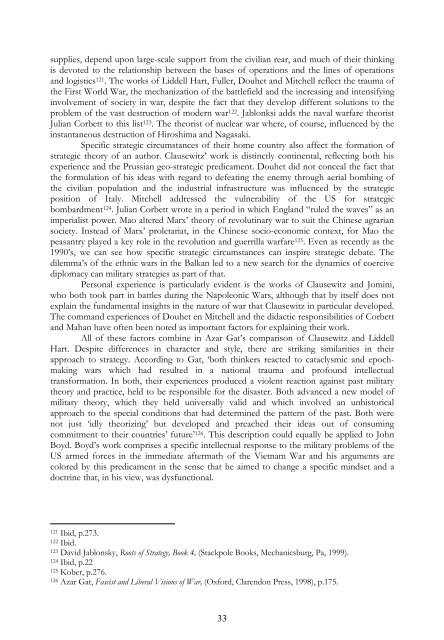Science, Strategy and War The Strategic Theory of ... - Boekje Pienter
Science, Strategy and War The Strategic Theory of ... - Boekje Pienter
Science, Strategy and War The Strategic Theory of ... - Boekje Pienter
You also want an ePaper? Increase the reach of your titles
YUMPU automatically turns print PDFs into web optimized ePapers that Google loves.
supplies, depend upon large-scale support from the civilian rear, <strong>and</strong> much <strong>of</strong> their thinkingis devoted to the relationship between the bases <strong>of</strong> operations <strong>and</strong> the lines <strong>of</strong> operations<strong>and</strong> logistics 121 . <strong>The</strong> works <strong>of</strong> Liddell Hart, Fuller, Douhet <strong>and</strong> Mitchell reflect the trauma <strong>of</strong>the First World <strong>War</strong>, the mechanization <strong>of</strong> the battlefield <strong>and</strong> the increasing <strong>and</strong> intensifyinginvolvement <strong>of</strong> society in war, despite the fact that they develop different solutions to theproblem <strong>of</strong> the vast destruction <strong>of</strong> modern war 122 . Jablonksi adds the naval warfare theoristJulian Corbett to this list 123 . <strong>The</strong> theorist <strong>of</strong> nuclear war where, <strong>of</strong> course, influenced by theinstantaneous destruction <strong>of</strong> Hiroshima <strong>and</strong> Nagasaki.Specific strategic circumstances <strong>of</strong> their home country also affect the formation <strong>of</strong>strategic theory <strong>of</strong> an author. Clausewitz’ work is distinctly continental, reflecting both hisexperience <strong>and</strong> the Prussian geo-strategic predicament. Douhet did not conceal the fact thatthe formulation <strong>of</strong> his ideas with regard to defeating the enemy through aerial bombing <strong>of</strong>the civilian population <strong>and</strong> the industrial infrastructure was influenced by the strategicposition <strong>of</strong> Italy. Mitchell addressed the vulnerability <strong>of</strong> the US for strategicbombardment 124 . Julian Corbett wrote in a period in which Engl<strong>and</strong> “ruled the waves” as animperialist power. Mao altered Marx’ theory <strong>of</strong> revolutinary war to suit the Chinese agrariansociety. Instead <strong>of</strong> Marx’ proletariat, in the Chinese socio-economic context, for Mao thepeasantry played a key role in the revolution <strong>and</strong> guerrilla warfare 125 . Even as recently as the1990’s, we can see how specific strategic circumstances can inspire strategic debate. <strong>The</strong>dilemma’s <strong>of</strong> the ethnic wars in the Balkan led to a new search for the dynamics <strong>of</strong> coercivediplomacy can military strategies as part <strong>of</strong> that.Personal experience is particularly evident is the works <strong>of</strong> Clausewitz <strong>and</strong> Jomini,who both took part in battles during the Napoleonic <strong>War</strong>s, although that by itself does notexplain the fundamental insights in the nature <strong>of</strong> war that Clausewitz in particular developed.<strong>The</strong> comm<strong>and</strong> experiences <strong>of</strong> Douhet en Mitchell <strong>and</strong> the didactic responsibilities <strong>of</strong> Corbett<strong>and</strong> Mahan have <strong>of</strong>ten been noted as important factors for explaining their work.All <strong>of</strong> these factors combine in Azar Gat’s comparison <strong>of</strong> Clausewitz <strong>and</strong> LiddellHart. Despite differences in character <strong>and</strong> style, there are striking similarities in theirapproach to strategy. According to Gat, ‘both thinkers reacted to cataclysmic <strong>and</strong> epochmakingwars which had resulted in a national trauma <strong>and</strong> pr<strong>of</strong>ound intellectualtransformation. In both, their experiences produced a violent reaction against past militarytheory <strong>and</strong> practice, held to be responsible for the disaster. Both advanced a new model <strong>of</strong>military theory, which they held universally valid <strong>and</strong> which involved an unhistoricalapproach to the special conditions that had determined the pattern <strong>of</strong> the past. Both werenot just ‘idly theorizing’ but developed <strong>and</strong> preached their ideas out <strong>of</strong> consumingcommitment to their countries’ future’ 126 . This description could equally be applied to JohnBoyd. Boyd’s work comprises a specific intellectual response to the military problems <strong>of</strong> theUS armed forces in the immediate aftermath <strong>of</strong> the Vietnam <strong>War</strong> <strong>and</strong> his arguments arecolored by this predicament in the sense that he aimed to change a specific mindset <strong>and</strong> adoctrine that, in his view, was dysfunctional.121 Ibid, p.273.122 Ibid.123 David Jablonsky, Roots <strong>of</strong> <strong>Strategy</strong>, Book 4, (Stackpole Books, Mechanicsburg, Pa, 1999).124 Ibid, p.22125 Kober, p.276.126 Azar Gat, Fascist <strong>and</strong> Liberal Visions <strong>of</strong> <strong>War</strong>, (Oxford, Clarendon Press, 1998), p.175.33
















